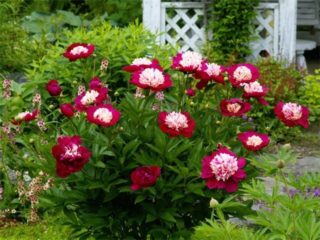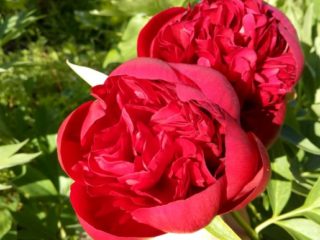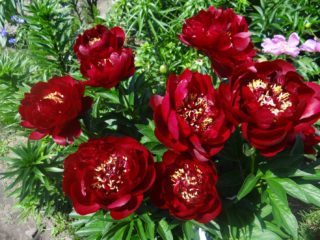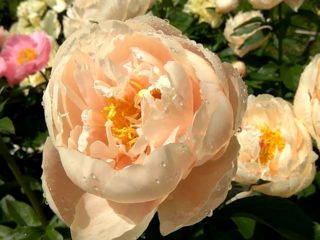Content
Peony Rosea Plena is a graceful and fragile flower that charges those around with its "pink mood". He attracts the eye among the greenery of the flower garden of the personal plot. Its main advantages are its attractive appearance, unpretentiousness and resistance to low temperatures.
Description of peony Rosea Plena
Rosea Plena is a well-known variety to many gardeners. This medicinal plant belongs to the group of herbaceous perennials. The height of the central shoots is 70-80 cm. The bush is medium-spreading with a growth width of up to 90 cm. The stems are weak and require a support. Peony grows in nests. Dark brown roots have fusiform thickenings.
Photos and descriptions of Rosi Plena peonies can be found not only on the forums of gardeners, but also on the sites of nurseries, since the plant is very in demand and popular.
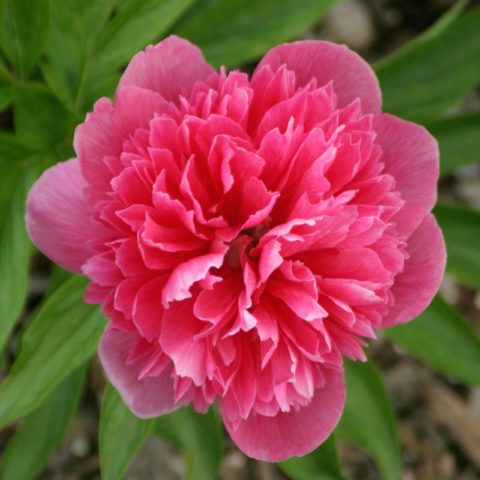
Peony flowers can be pink, red and white.
Peony leaves are bright green with a shiny coating. The shape of the leaf plates is elongated, triple-dissected with a solid edge. The flowers are double, corrugated, with a structure reminiscent of wrinkled silk in the shade of “strawberry with cream”.
The fruits of "Rosea Plena" are multileaf with seed pods, each of which contains oval seeds of black or brown color. Fruiting can be observed from the 4th year of the life of the culture (September-October).
The variety "Rosea Plena" is not particularly whimsical and can grow in areas with a little penumbra. However, in places with good lighting, it shows a better development rate and an earlier flowering period.
The plant belongs to frost-resistant varieties and can withstand temperatures as low as -28 ° C. Available for cultivation in the middle lane and in the northern regions. In the latter case, it requires measures to prepare for the winter.
Flowering features
The variety "Rosea Plena" belongs to the group of terry peonies. The diameter of the inflorescence (in blooming form) reaches 12-14 cm. Each flower is a "structure" of bearing coral pink petals and a large spherical cluster of smaller elements (petals) located on them. The flowers of the medicinal peony Rosea Plena tend to brighten by the end of the flowering period.
The variety is characterized by early flowering (14-15 days earlier than other varieties of peonies). The culture shows the first blossoming flowers already at the beginning of the 1st summer month, and by the middle of June one can observe the abundant and bright flowering of the entire bush. The aroma is delicate, light, with slight notes of sweetness.
The splendor of the flowering of peonies depends on many factors. Most often this is influenced by:
- correctly selected landing site (illumination, drainage);
- planting depth (too close to the surface of the earth or, conversely, deep);
- the age of the bush;
- timely removal of faded buds;
- composition and properties of the soil (acidity);
- top dressing (the presence of nitrogen fertilizers);
- watering (lack of moisture negatively affects the splendor of flowering).
Compliance with all conditions will lead to abundant and bright flowering of the Rosea Plena bush.
Application in design
Peonies are actively used in landscape design as bright accents and central elements of compositions of flower beds and flower beds. The main requirement for "neighbors" is similar conditions in combination with smaller inflorescences.In this case, the color scheme of the "partners" is not decisive.
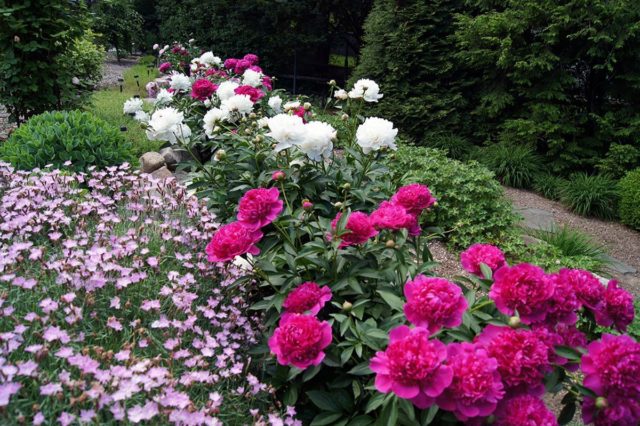
Peony is good for cutting and landscape
Peony flowers are characterized by clear contours and shape, therefore, the beauty of the plant is most organically emphasized by the lush, slightly chaotic green mass of its “neighbors”. However, Rosea Plena will not tolerate overgrowing plants that can negatively affect its own growth.
Geranium is an excellent choice for a peony neighborhood. It is a little more modest than its bright neighbor, but at the same time it successfully emphasizes the shades and “doubleness” of the colors of “Rosea Plena”. The Compositae variety of geranium is suitable for this variety.
The ideal partner for the Rosea Plena peony is also tansy, emphasizing the delicacy of pink flowers. Its small inflorescences contrast very well with the large buds of pink peony.
The correct background for the peonies is very important. A good example for coral pink varieties would be a catnip with purple flowers. An excellent tandem "Rosea Plena" will create with phloxes, hosts, irises and daylilies. You can make the edging of a flower garden with peonies using squat violets, primroses and cuffs.
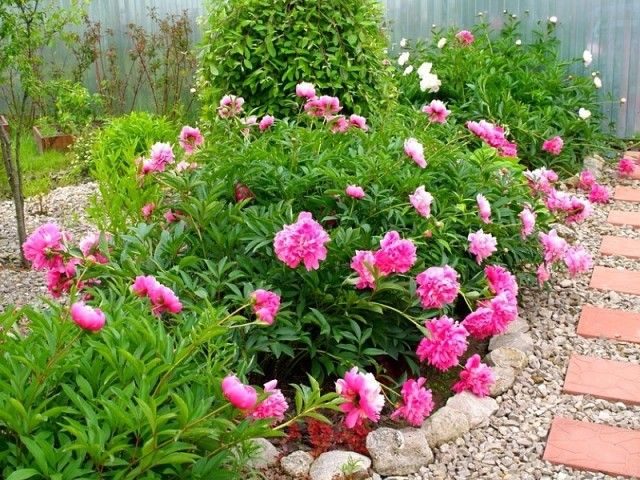
The plant may have a very early flowering period - May
Peonies "Rosea Plena" - an option for a garden, flower garden and personal plot, but not for a loggia or balcony. For an apartment, it is better to choose shorter varieties with strong stems that do not require additional support.
Reproduction methods
Reproduction of "Rosea Plena" peonies occurs most often in 2 ways: by dividing the rhizome or by root cuttings.
In the first case, a bush is used that is at least 5 years old. The best option is 7 years. The procedure starts at the end of August or at the beginning of September. During this period, the buds on the root system of the plant have already been formed, and the regrowth of roots has not yet occurred.
The root system is washed and dried in the shade for 4-5 hours. After that, the bush is divided into "delenki". In this case, 3-4 buds and 2-3 strong roots are left on each part (the rest are shortened). The last stage is the treatment of the rhizomes with a fungicide and "dusting" with wood ash. Having withstood the "delenki" day in the shade, you can start landing.
Root cuttings are pieces of roots with buds located on them. The planting is carried out directly into the ground at a distance of 15-20 cm from each other. The survival rate of cuttings is 75-80%.
Additional breeding methods are:
- seminal;
- cuttings;
- vertical layering.
These methods are more labor intensive and require significant horticultural experience.
Planting a herbaceous peony Rosi Plena
Planting of peonies "Rosea Plena" is carried out mainly in the fall in the first decade of September. Preparation of the soil begins one month before the procedure. Plants of this species prefer moderately dry fertile soils. To begin with, dig a landing hole with dimensions of 60 × 60 × 60. Its bottom is lined with drainage material (broken brick, crushed stone or coarse sand).
The soil is mixed with superphosphate (200 g), compost, potassium sulfate (100 g), lime (100 g) and wood ash (300 g). The fertilized soil is poured back into the hole and left for several days. As soon as the soil settles, you can start planting. Rhizome "Rosea Plena" is placed in the hole and carefully covered with garden soil, slightly tamping it. Then the "delenka" is watered.
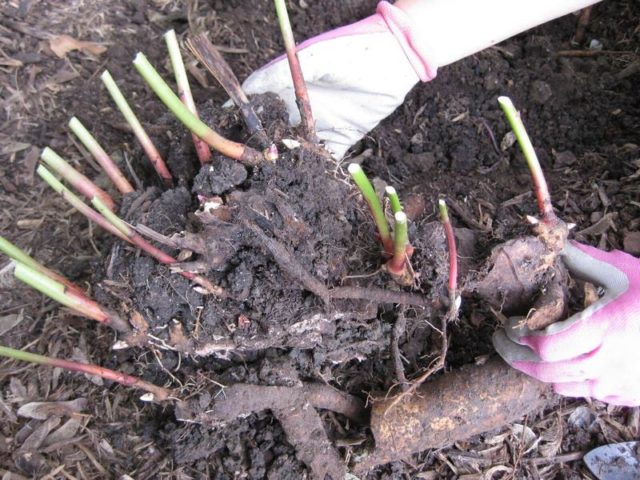
The plant loves light, so it should be planted in open, sunny areas.
Rosea Plena peonies are known for their adaptive qualities. The first year they do not bloom, but you should not worry.
Follow-up care
Peonies "Rosea Plena" are moderately moisture-loving plants. One 5-year-old bush takes 20-30 liters of water. This is exactly how much it takes for the moisture to reach the base of the rhizome.The culture requires special watering in the spring, when buds are formed, and in the fall, at the time of laying young buds. Peonies are watered at the root, the soil near the bush is preliminarily loosened.
As for feeding, at the beginning of growth, the variety is fertilized with ammonium nitrate (15 g per 12 l). Since mid-May, water-soluble mineral complexes have been used for irrigation. This procedure is carried out once every 30 days. At the moment of bud formation, fertilizing with potassium-phosphate complexes is performed. In summer, the plant is only watered and weeds are weeded in the area next to the bush.
Preparing for winter
In the fall, after the first frost, the bush is cut off, leaving small sections of stems with 3-4 leaf plates. This is a prerequisite for the establishment of kidney replacement. Since the variety "Rosea Plena" is classified as a frost-resistant species, it does not require shelter. However, it does not hurt to huddle the bush.
However, only transplanted "Rosea Plena" can be covered with a layer of peat or humus (thickness 10-15 cm). But in the spring, before the first shoots appear, it is imperative to remove the covering layer or the plant will "mate".
Pests and diseases
The variety of peonies Rosea Plena officialis is ill infrequently. The culture has good immunity to most diseases. The main danger for peonies is the ring spot virus. The first symptomatology is the appearance of green-yellow ringed streaks on the leaf plates of the bush.
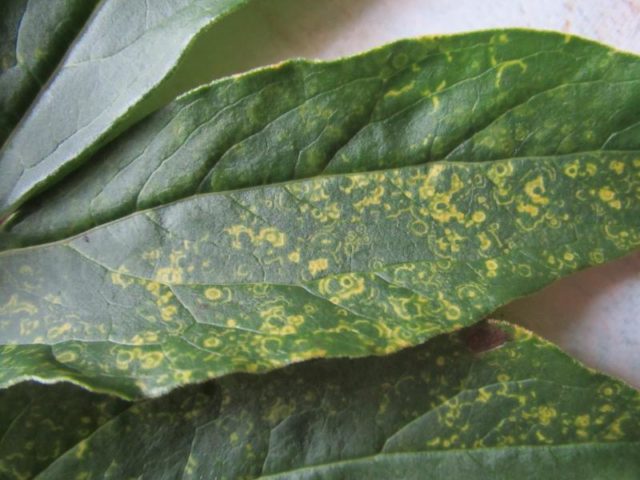
If the irrigation regime is violated, gray rot may appear
In conditions of high humidity, gray rot can manifest itself. And if the humid period is accompanied by high temperatures, then rust may also appear, which manifests itself in the form of yellow-brown spots.
Of insects, one should beware of bronzoviks that feed on stamens and petals, nematodes that settle on the roots, and ants that carry aphids. You can fight them with drugs such as Aktara or Kinmix.
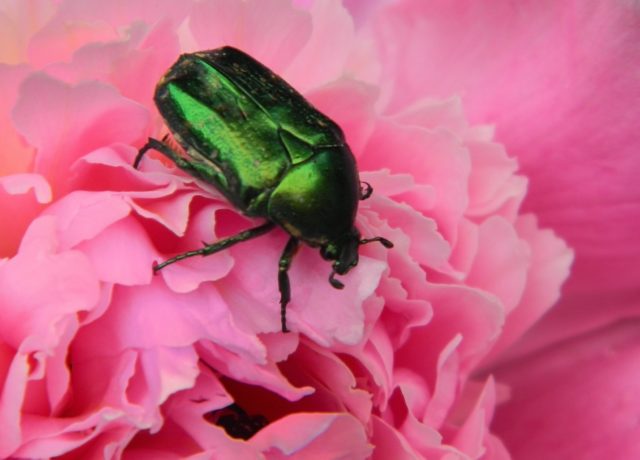
To get rid of insect pests, you need to spray the buds with a solution of "Fufanon"
As for viruses, if they are damaged, you should get rid of the diseased bush, since it is almost impossible to cure it. Fitoverm has proven itself well against rot and rust. As a preventive measure, you can use "Speed" or "Horus".
Conclusion
Peony Rosea Plena is a culture that is always popular with both beginners in gardening and more experienced fans of peonies. Bright appearance and unpretentious care makes this variety an ideal tool for creating landscaping.
Reviews of the peony Rosea Plena
Almost all reviews of Rosi Plena peonies are admirably positive.
https://www.youtube.com/watch?v=DX0-hsK6qDM&feature=emb_logo



